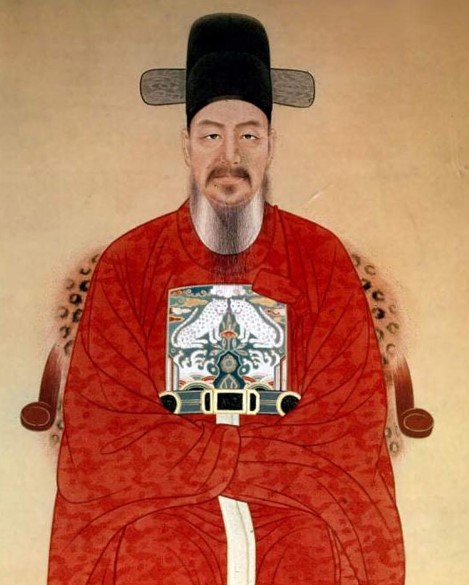이순신은 조선 중기의 대표적인 무신이자, 한국 역사에서 가장 존경받는 영웅 중 한 명입니다. 그는 임진왜란(1592~1598) 당시 일본의 침략으로부터 조선을 지켜낸 해군 지휘관으로, 독창적인 전술과 전략을 통해 조선 해군의 역량을 극대화했습니다. 그의 생애와 업적을 구체적으로 살펴보겠습니다.

1. 생애와 성장 배경
- 출생: 이순신은 1545년 4월 28일(음력) 서울에서 태어났습니다. 그는 충청남도 아산의 명문가 출신으로, 어린 시절부터 학문과 무예를 연마하며 강직한 성품과 지도력을 키웠습니다.
- 관직 생활: 1576년 무과에 급제하여 여러 지역에서 군관으로 활동했습니다. 그는 부임지에서 민생을 돌보고 지역 방어를 강화하며 백성들의 신뢰를 얻었습니다.
2. 임진왜란에서의 활약
1592년 일본이 조선을 침략하며 임진왜란이 발발했습니다. 당시 이순신은 전라좌수사로 임명되어 조선 해군을 이끌게 됩니다. 그는 뛰어난 전략가로, 적은 병력과 자원으로도 일본군을 상대로 연전연승을 거두며 조선의 해상권을 지켰습니다.
- 옥포해전(1592년): 임진왜란 최초의 해전에서 승리를 거두며 조선 해군의 사기를 끌어올렸습니다.
- 한산도 대첩(1592년): 학익진(학의 날개 모양의 대형) 전술을 사용해 일본 함대를 크게 무찔렀습니다. 이 전투는 조선 해군이 일본의 해상 보급로를 차단하는 데 결정적 역할을 했습니다.
- 명량해전(1597년): 이순신은 12척의 배로 약 130척의 일본 함대를 상대로 승리했습니다. 이 전투는 그의 전략적 천재성과 리더십을 보여주는 대표적 사례로 평가받습니다.
3. 리더십과 거북선
- 리더십: 이순신은 공정한 리더십으로 부하들의 신뢰를 얻었습니다. 그는 병사들과 고락을 함께하며, 엄격하면서도 인간적인 지도자로서 부하들의 존경을 받았습니다.
- 거북선: 그는 세계 최초의 철갑선인 거북선을 제작하여 해상 전투에서 큰 효과를 발휘했습니다. 거북선은 일본 함대에 큰 공포를 안겨주며, 조선의 승리에 크게 기여했습니다.
4. 최후의 순간과 유산
- 노량해전과 전사: 1598년 12월, 임진왜란의 마지막 전투인 노량해전에서 일본군을 상대로 승리를 거두었으나, 전투 도중 이순신은 전사했습니다. 그의 마지막 말은 "내 죽음을 알리지 말라"였으며, 이는 자신의 희생을 끝까지 군의 사기를 위해 숨기려는 의지의 표현이었습니다.
- 유산: 이순신은 사후 충무공이라는 시호를 받았으며, 그의 업적은 한국과 세계 해군사에 길이 남아 있습니다. 한국의 여러 도시와 기관, 해군 기지에는 그의 이름이 붙어 있으며, 매년 이순신을 기리는 다양한 행사가 열립니다.
이순신의 역사적 의의
이순신은 단순히 군사적 승리뿐만 아니라, 국가와 민족을 위해 헌신한 리더의 상징으로 평가받습니다. 그의 전술은 오늘날에도 연구되고 있으며, 특히 약한 자원으로 강한 적을 이기는 전략적 사고는 현대 군사학의 귀감이 됩니다. 또한, 그의 삶과 정신은 성실, 충성, 리더십, 희생의 가치로서 후대에 큰 교훈을 남기고 있습니다.
Yi Sun-sin (1545-1598)
Yi Sun-sin is one of the most respected heroes in Korean history and a prominent military commander of the mid-Joseon Dynasty. He defended Joseon (Korea) from Japanese invasions during the Imjin War (1592-1598), maximizing the Korean navy's capabilities through innovative tactics and strategies. Here's a detailed look at his life and accomplishments.
1. Early Life and Background
- Birth: Yi Sun-sin was born on April 28, 1545 (Lunar calendar) in Seoul, Korea. He came from a prominent family in Asan, Chungcheongnam-do, and developed a strong character and leadership skills through his studies and martial training from a young age.
- Military Career: In 1576, he passed the military examination and served as a military officer in various regions. He earned the trust of the people by caring for their welfare and strengthening local defenses.
2. Achievements During the Imjin War
In 1592, Japan invaded Joseon, initiating the Imjin War. At the time, Yi Sun-sin was appointed as the commander of the Left Naval Station of Jeolla Province, leading the Joseon navy. As a brilliant strategist, he achieved numerous victories against the Japanese with limited resources and troops, securing control over the seas.
- Battle of Okpo (1592): Yi Sun-sin won the first naval battle of the Imjin War, boosting the morale of the Joseon navy.
- Battle of Hansando (1592): Using the "Crane Wing" formation, he decisively defeated the Japanese fleet. This battle was crucial in cutting off the Japanese naval supply lines.
- Battle of Myeongnyang (1597): With just 12 ships, Yi Sun-sin triumphed over approximately 130 Japanese ships. This battle is celebrated as a prime example of his strategic genius and leadership.
3. Leadership and Turtle Ship
- Leadership: Yi Sun-sin was known for his fair leadership, earning the trust of his subordinates. He shared the hardships and joys with his soldiers, being a strict yet compassionate leader who garnered their respect.
- Turtle Ship: He developed the Turtle Ship, the world's first ironclad warship, which proved highly effective in naval battles. The Turtle Ship instilled fear in the Japanese fleet and significantly contributed to Joseon's victories.
4. Final Moments and Legacy
- Battle of Noryang and Death: In December 1598, Yi Sun-sin achieved victory against the Japanese in the final battle of the Imjin War, the Battle of Noryang. However, he was killed in action. His final words were, "Do not let my death be known," reflecting his desire to maintain the morale of his forces.
- Legacy: Posthumously, Yi Sun-sin was awarded the title of Chungmugong. His achievements are etched into the annals of Korean and world naval history. Numerous cities, institutions, and naval bases in Korea bear his name, and various events commemorate him annually.
Historical Significance of Yi Sun-sin
Yi Sun-sin is recognized not only for his military victories but also as a symbol of dedication to the nation and people. His tactics continue to be studied, especially his strategic thinking on overcoming stronger enemies with limited resources, serving as a model in modern military studies. His life and spirit teach invaluable lessons of sincerity, loyalty, leadership, and sacrifice to future generations.
I hope this translation helps! If you have any more requests or need further information, feel free to let me know.